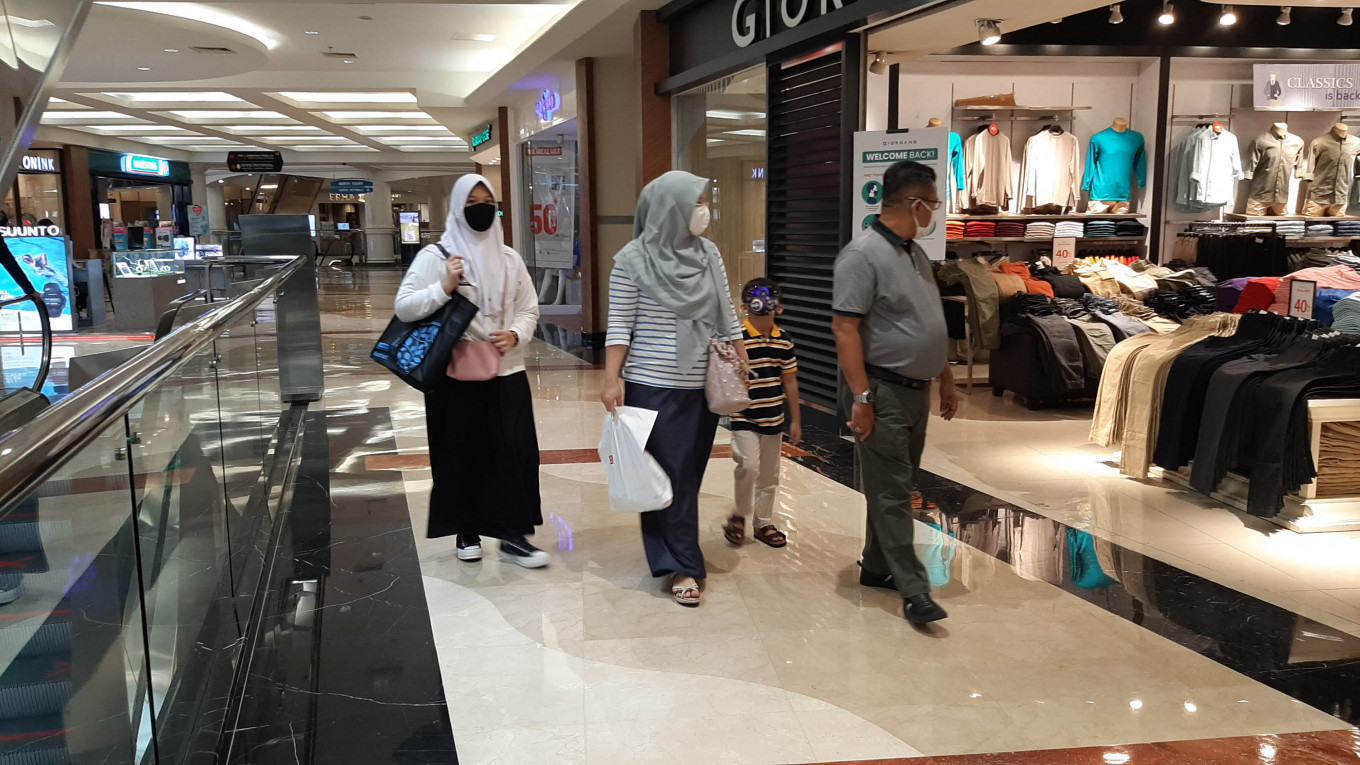Popular Reads
Top Results
Can't find what you're looking for?
View all search resultsPopular Reads
Top Results
Can't find what you're looking for?
View all search resultsDemand for retail space in Jakarta shrinks in Q3 as PSBB hits small retailers
From the 2.9 million square meters in existing retail space in Jakarta, net absorption shrank 13,400 sqm between July and September this year, JLL data show. In comparison, there was 300 sqm in new demand in the second quarter this year.
Change text size
Gift Premium Articles
to Anyone
 Not a solution: A family window-shops in late June while wearing masks at a shopping mall in South Jakarta. Shopping malls started reopening in early June under the eased restrictions of the 'new normal' phase, but the number of cases nationwide has jumped significantly, even as Indonesia sees a decline in the number of deaths. (JP/Arief Suhardiman)
Not a solution: A family window-shops in late June while wearing masks at a shopping mall in South Jakarta. Shopping malls started reopening in early June under the eased restrictions of the 'new normal' phase, but the number of cases nationwide has jumped significantly, even as Indonesia sees a decline in the number of deaths. (JP/Arief Suhardiman)
D
emand for retail space in Jakarta contracted in the third quarter this year, the first time since the first quarter of 2019, as small retailers impacted by the COVID-19 crisis were forced to close their stores, according to property consultant Jones Lang LaSalle (JLL) Indonesia.
From the 2.9 million square meters (sqm) in existing retail space in Jakarta, net absorption shrank 13,400 sqm between July and September this year, JLL data show. In comparison, there was 300 sqm in new demand in the second quarter this year.
JLL Indonesia head of research James Taylor said on Thursday that the large-scale social restrictions (PSBB) imposed in Jakarta, which had restricted the operations of mall tenants, particularly food and beverage (F&B) retailers, had led to permanent closures of small tenants.
“Retailers have been severely restricted in their operations, with F&B retailers unable to provide dine-in services, not just during the third quarter, but for most of the year since March. Entertainment centers at malls have also been unable to operate,” Taylor said during an online press conference.
The retail industry has been hit hard by the pandemic with more than 100,000 workers facing the risk of being furloughed, according to the Indonesian Shopping Center Tenants Association (Hippindo).
Hippindo attributed these circumstances to Jakarta’s PSBB measures, which were implemented for a second time between Sept. 14 and Oct. 11, after initially being enforced from April to June, as well as weakening consumer purchasing power.
Read also: 100,000 retail workers on brink of furlough as consumption free-falls
Household spending, which accounts for more than half of Indonesia’s gross domestic product (GDP), fell 5.51 percent year-on-year (yoy) in the second quarter, compared with annual growth of 5.18 percent in the same period last year, according to Statistics Indonesia (BPS).
A recent Bank Indonesia (BI) survey showed that retail sales fell 9.2 percent yoy in August, a smaller drop than the 12.3 percent contraction in July. The central bank’s survey projected retail sales in September to be down 7.3 percent from the same month last year.
JLL projects the retail property market to remain under pressure during the fourth quarter of 2020, as further retail store closures loom.
“As we move into Q4, I don’t think it’s any secret that it’s going to be a hard time for some retailers and we might well see some more closures,” Taylor said.
However, Taylor went on to say that the high occupancy rate of 88 percent for retail properties in the third quarter this year, down slightly from 89 percent in the second quarter, could be seen as a sign that retail tenants remained resilient and were able to weather the crisis.
“It’s a challenging situation in the short to medium term but there’s no reason for us not to be confident,” he added.
JLL projects that retail market absorption will rebound in 2021 with demand for retail space tipped to soar by more than 100,000 sqm, the highest level since 2013.
Despite this projection, rental rates for spaces in upper, middle, and lower middle sector shopping centers are predicted to remain stagnant until the end of next year.
According to a presentation document from JLL, monthly rent for upper-class shopping centers is expected hover slightly above Rp 600,000 (US$40.75) per sqm until the end of 2021, a small increase from this year’s third quarter rate of Rp 543,000.
The retail market occupancy rate is also projected to dip below 85 percent in 2021, as more than 200,000 sqm of new retail space is set to enter the market amid the low demand, JLL data show.
Given the significant impacts of the pandemic on the retail property market, Taylor expected shopping centers to see a transformation in the types of tenants, with more coworking spaces and health facilities to fill up retail space in the future.
“In the future, shopping malls will no longer just be places to buy things,” he said.
On Sept. 29, Indonesian Shopping Center Association (APPBI) chairman Alphonzus Widjaja asked the central government and regional administrations to provide incentives and relax taxes for the retail industry.
“The government needs to provide a direct stimulus for shopping centers. We were able to survive during the last couple of months, but it’s now getting extremely difficult for us, as the number of visitors has dropped to only 10 percent of capacity,” he said.









